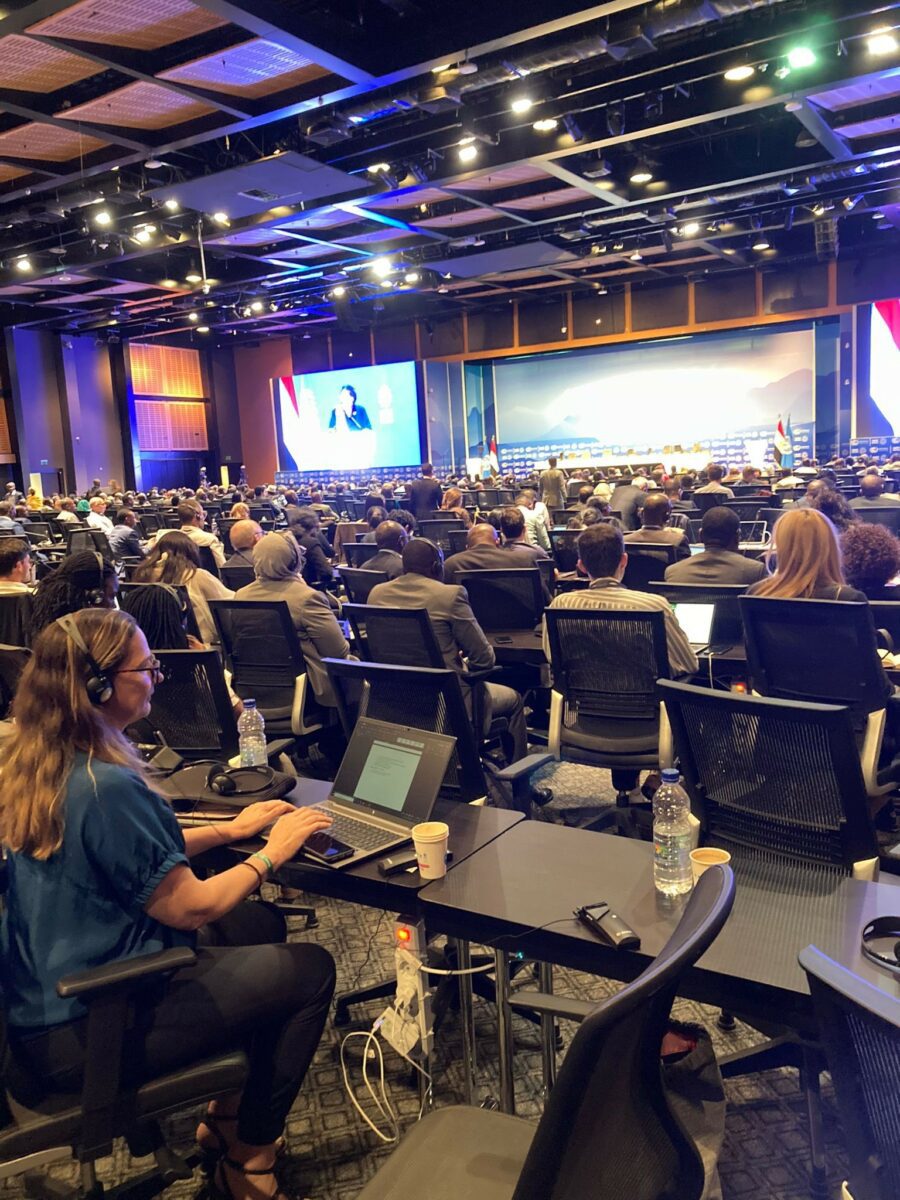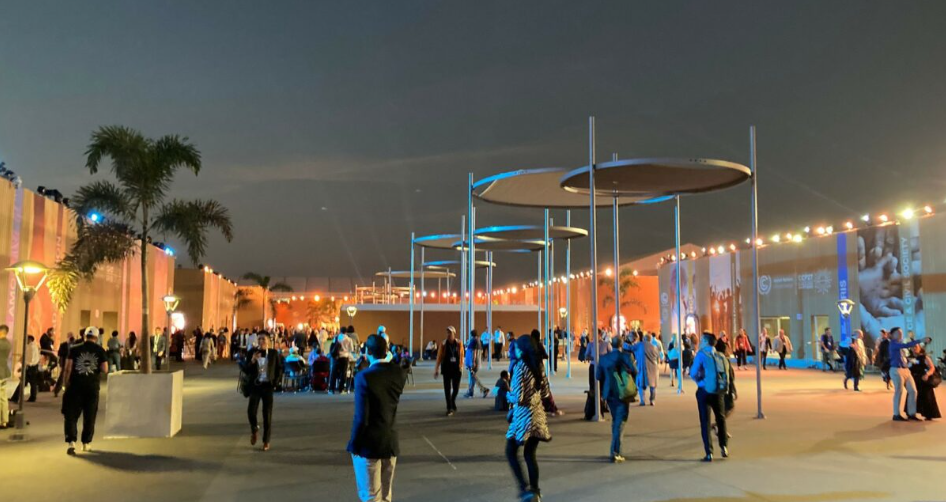COP27, touted as the “implementation COP” has opened this week with renewed calls from UN & national leaders for global cooperation to implement the goals of The Paris Agreement, with a particular focus on adaptation and loss & damage funding.
“As one CMI delegate said from Egypt overnight, this COP is shaping up more as an “Investment COP” than an “Implementation COP”. This could prove most apt with the strong focus on climate finance, loss and damage and carbon market rules to follow over the next fortnight,” said John Connor, CEO CMI attending the talks in Egypt next week.
At the talks, outgoing UK COP President Alok Sharma emphasised the need for unity amongst parties to move forward with implementation of proposed solutions, while incoming Egyptian COP President Sameh Shoukry echoed this sentiment. Shoukry established the tone for the coming two weeks with a call to move beyond pledges and towards implementation “‘for the sake of humanity and the planet,”’ highlighting the need to accelerate implementation in tandem with scaling up ambitions in line with countries’ capacities.
UNFCCC Executive Secretary Simon Stiell continued the theme of cooperation and capacity-linked action, but also outlined 3 critical lines of action that this COP must take in order to distinguish it from previous iterations:
- Demonstrate a shift to implementation and concrete action
- Cement progress on the critical workstreams of mitigation, adaptation, finance, and loss & damage
- Enhance the delivery of the principles of transparency and accountability throughout the process
The opening statements concluded with IPCC Chair Dr Hoesung Lee reiterating the need for clarity around finance in order to fund adaptation and mitigation solutions, particularly in developing countries. However, Lee also used his statement to remind parties that adaptation will only be successful if enacted alongside decarbonisation: “the pre-requisite for successful adaptation is ambitious mitigation.”
World Leaders’ Summit continues calls for realignment of financial flows, and increased pace of implementation
The World Leaders’ Summit opened with addresses from key leaders, predominantly from the Global South. UN Secretary General Antonio Guterres called for increased ambition on the part of both developed, and developing countries. Announcing the Climate Solidarity Pact to foster partnerships between developed and developing & emerging economies, Guterres said that “‘developed countries must take the lead, but emerging economies are also critical to bending the global emissions curves.”’ The success of this, he emphasised, will be dependent upon redirecting financial flows away from fossil fuel subsidies and towards adaptation. Additionally, in recognition of the previous disparity between pledges and implementation, Guterres called for the development of a roadmap outlining how finance will be garnered and implemented for adaptation, including key milestones to track progress.
Director of the London School of Economics, Minouche Shafik reiterated the importance of the green economy in leading decarbonisation but also highlighted the substantial sum of 4-6 Trillion USD per year required to achieve the scale of the Paris Agreement goals. Failing to act now will only increase this sum required as adaptation needs become more extensive and severe. Shafik emphasised the need to shift financial mindsets towards recognising the long-term positive returns on climate positive investments, rather than short-term gains in fossil fuels. Governments were encouraged to foster this shift by de-risking the regulatory environment via the creation of standardised reporting methods and platforms.
Again, the importance of transparency, cooperation and standardisation was emphasised.
Former US Vice President Al Gore built upon these themes to call upon increased flows of private capital, reiterating the role that business can play in the green transition if supported correctly by government. Additionally, Gore also called for the creation of transparent and standardised inventories for financial flows across the private, and government sectors, as a matter of urgency.
The first session of the World Leader’s Summit closed with a powerful keynote from Prime Minister of Barbados, Mia Mottley. Mottley suggested that the fault lines of current global industrial design with the Global South remaining at the mercy of the Global North are to blame for lack of effective action on climate change adaptation and mitigation to date.
Drawing on natural disasters that have occurred across the globe this year, Mottley highlighted the urgency with which global leaders, in both the public and private sectors, need to address loss & damage funding. “‘It is critical that we address the issue of loss and damage. The talk must come to an end,”’ Mottley said. Before calling for state and non-state parties to come together and collaboratively define what loss & damage funding could look like. Importantly, this should include a reimagination of how finance is distributed, with a further emphasis on reparation from polluters, rather than conditional loans.
Strong words concluded the first session of the World Leaders’ Summit: “The time is running out on us, and yes, we have the choice… What will our choice be? We have the power to act, or the power to remain passive and do nothing.”
COP27 has opened with a clear prioritisation of the key themes: cooperation, adaption, loss & damage, and finance. We can expect to see greater pressure to decarbonise and increase adaptation finance placed on heavy emitters .emitters. Additionally, we will likely see greater opportunities for collaboration between government and non-governmental agencies, which will be equally vital over the coming decade as the scale of requirement for adaptation finance increases.
Australia joins Forests and Climate Leaders Partnership
Early on day 2, Australia also announced that it has become a founding member of the Forests and Climate Leaders Partnership, a new international group to accelerate the contribution of forests to global climate action.
The UK-led voluntary partnership was formally launched today at COP27 in Egypt to maintain the momentum of global action on climate change through forest-based initiatives.
“CMI welcomes today’s announcement that Australia will be joining the Forest and Climate Leadership Partnership, building on the support from the then Coalition Government for the Glasgow Leaders Declaration on Forest and Land Use. This was a commitment to reverse deforestation by 2030,” said CMI CEO John Connor.
“While Australia’s land sector has been removed more carbon dioxide from the atmosphere than it has contributed in recent years, there is still much work to be done to deepen investments in this sector and ensure we continue to work towards a negative emissions and nature positive future,” he said.
CMI will be represented at COP27 for the two weeks by Janet Hallows, Director Climate Programs and nature-based solutions. John Connor, former head of the COP23 Presidency Secretariat of the Fiji Government, will be present for the last week from 13 November.
CMI has formal business organisation observer status with the UNFCCC and will be hosting and, with its members, participating in numerous panel sessions in the Australian Pavilion and other venues at COP27.
For regular updates on COP27 and CMI’s events and updates, visit our Cop27 Hub here.
About the Carbon Market Institute
The Carbon Market Institute (CMI) is a member-based institute accelerating the transition towards a negative emissions, nature positive world. It champions best practice in carbon markets and climate policy, and its nearly 150 members include primary producers, carbon project developers, Indigenous organisations, legal, technology and advisory services, insurers, banks, investors, corporate entities and emission intensive industries. The positions put forward constitute CMI’s independent view and do not purport to represent any CMI individual, member company, or industry sector. CMI’s latest Advocacy Policy Positions Statement can be viewed here.




